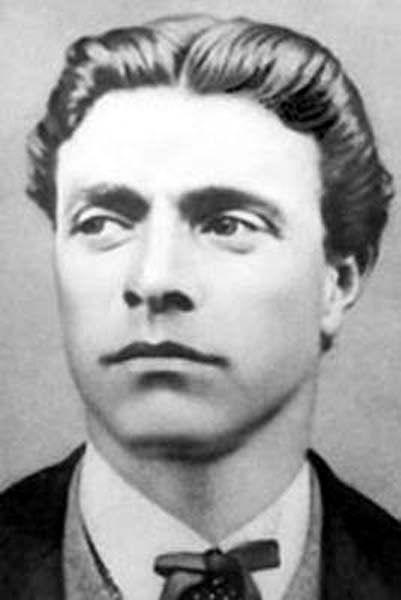Vassil Ivanov Kunchev, Levski, whom the present-day Bulgarians consider
their greatest national hero of all times and epochs, was born in Karlovo,
a prosperous center of craft-industry in 1837. At the age of twenty
four he took the vows of a deacon. The lot in store for the young
Bulgarian was obviously not the one of a monk living in resignation to
the world. In 1862 he fled to Serbia and enlisted as a volunteer
in the Bulgarian legion raised by Rakovski. The legion took part
in the Serbo-Turkish hostilities. Between 1862-1868 Levski participated
in almost all Bulgarian armed assaults against the Ottoman empire.

The revolutionary theory which took
form in Vassil Levski's mind towards the end of the 60s, turned out to
be a leap forward for the Bulgarian liberation movement. Levski viewed
the national liberation revolution as a concomitant armed upheaval of the
whole Bulgarian population in the Ottoman empire. It followed that
this uprising had to be well-prepared in advance, with all adequate military
training and proper coordination on the part of an internal revolutionary
organization branching out into committees in each living area. That
organization was supposed to operate independent from the plans or the
political combinations of any foreign powers which, as known by previous
experience, had brought only trouble and failure to the national revolutionary
cause.
Levski also determined the future form of government in liberated Bulgaria
- a democratic republic, standing on the principles of the Human and Citizen
Rights Charter of the Great French  Revolution.
That was the only document hitherto known to guarantee the individual freedom
of expression, speech, and association. In their essence Levski's
ideas tallied with the most radical ideas of the European bourgeois-democratic
revolution.
Revolution.
That was the only document hitherto known to guarantee the individual freedom
of expression, speech, and association. In their essence Levski's
ideas tallied with the most radical ideas of the European bourgeois-democratic
revolution.
In more practical terms, in 1869 Levski addressed himself to the task of setting up local committees. By the middle of 1872 he had scoured the Bulgarian lands with the dedication of an apostle, and succeeded in establishing a strong network of committees in hundreds of Bulgarian towns and villages which were in constant contact with and subordination to the clandestine government in the town of Lovech. They provided weapons, organized combat detachments, and got traitors and Turkish officials punished.
In May 1872, the Bulgarian Revolutionary Central Committee and the Internal Revolutionary Organization, convinced that a coordination of the efforts would be for the general good, merged into one organization. Revolutionary uplift overwhelmed the whole country.
This enthusiasm was short-lived as only a few months on, in the autumn
of that year, during a robbery of a Turkish post-office meant to procure
money for weapons, the Turkish police picked up the trail of some committees
in northeast Bulgaria including the organization headquarters in Lovech.
Numerous arrests of revolutionaries followed, threatening the organization
to fall through. Karavelov demanded that Levski should immediately
rise the Bulgarians in revolt. Levski, who was in Bulgaria at that
time and was well-aware that the  population
was yet unprepared, refused to fulfill the order and tried to take into
his charge all documentation belonging to the organization - a safety precaution
against its getting into Turkish hand, which could destroy the movement
completely. Unfortunately, he himself fell in the hands of the Turkish
authorities who put him on trial and sentenced him to death by hanging.
Levski was sent to the gallows in Sofia in February 1873. The death
of Vassil Levski - a generally recognized leader of the national
revolutionary movement, caused temporary crisis. The Bulgarian Revolutionary
Central Committee was groping for new ways and means. A number of
revolutionaries undertook actions without coordinating them with the underground
headquarters, while others sank into apathy.
population
was yet unprepared, refused to fulfill the order and tried to take into
his charge all documentation belonging to the organization - a safety precaution
against its getting into Turkish hand, which could destroy the movement
completely. Unfortunately, he himself fell in the hands of the Turkish
authorities who put him on trial and sentenced him to death by hanging.
Levski was sent to the gallows in Sofia in February 1873. The death
of Vassil Levski - a generally recognized leader of the national
revolutionary movement, caused temporary crisis. The Bulgarian Revolutionary
Central Committee was groping for new ways and means. A number of
revolutionaries undertook actions without coordinating them with the underground
headquarters, while others sank into apathy.
More
| You are visitor
|
Created: December, 1999 |
Updated: 11 November, 2011 |
This site is designed and maintained by
Magdalena Anguelova
Questions? Comments? Suggestions?
Please, send an
e-mail.
Copyright ¿
1999-2012 Magdalena Anguelova
All Rights Reserved
